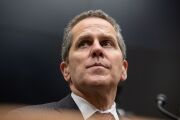
Federal Reserve Gov. Adriana Kugler on Monday warned U.S. tariffs could propel higher inflation and curb economic growth.
While Kugler's remarks — delivered at the International Economic Symposium in Dublin — argued that the U.S. economy had shown resilience up until now, she characterized the coming impact of tariffs as a negative supply shock that has slowed investment, could harm productivity and would soon show up in prices.
"In the near term, higher import costs will raise prices for both consumer goods and inputs to production," she said. "Given these expected price increases, real incomes will fall, and operating costs will rise, which will lead consumers to demand fewer final goods and services and firms to demand fewer inputs. Ultimately, I see the U.S. as likely to experience lower growth and higher inflation."
Kugler's remarks came after President Donald Trump announced an initial
Kugler struck a somewhat cautionary tone, despite some mixed economic indicators. In a positive development, the labor market remained somewhat stable this year,
Still, she said signs of a softening market are emerging. The job vacancy rate fell to 4.3% in March, and the proportion of job-openings-to-unemployed-people is lower than it was before the COVID-19 pandemic. Kugler also said she is watching forward-looking indicators closely, including an uptick in mentions of the word "layoffs" seen in the Fed's Beige Book economic report.
Gross domestic product contracted at a 0.3% annual rate in the first quarter — a notable setback, she said, when one considers the economy grew 2.5% last year. Kugler noted that the decline in GDP — the standard measure of U.S. economic output — likely overstated the slowdown, in part due to a surge in imports as manufacturers rushed to beat anticipated tariff hikes.
The Federal Reserve's
Inflation remains sticky, according to Kugler, with the Fed's preferred metric — the Personal Consumption Expenditures price index —
Companies are already indicating they are preparing to raise prices, and a Dallas Fed survey showed 55% of Texas firms plan to pass on most or all tariff costs — of those, 26% would pass such costs onto prices immediately and 64% say they will impose price hikes within three months of tariffs, which "would suggest that price increases may be observed soon," Kugler said.
These pressures, Kugler said, could erode real incomes, thus reducing consumer spending, and could also prompt businesses to scale back investment, undermining productivity and output growth.
"In conversations with business contacts, I have heard that firms are paying attention to the price sensitivity of consumers across the entire catalog of items sold," she said. "And [they] may spread price increases to less price-sensitive items to avoid reducing their profit margins."
Beyond tariffs, Kugler flagged rising global uncertainty — especially around trade policy — as itself another drag on demand that has tangible effects.
"In times of heightened uncertainty, businesses may delay investment decisions, and consumers may increase precautionary savings and postpone discretionary purchases," Kugler said. "Firms, anticipating lower demand for their services and products, may post fewer job openings and cut back on investments to expand capacity [and] workers, therefore, may have a more difficult time finding employment, decreasing economy-wide income and aggregate demand."






